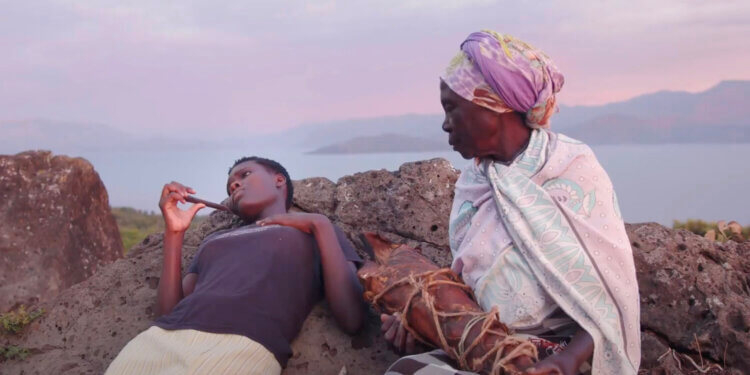It’s films like Nyamula, which premiered at the ongoing International Film Festival Rotterdam (IFFR) 2025, that put my idealism about the narrative expression of Kenyan culture and traditions into question – sometimes in profound, even painful ways. Often completely indifferent to universal consciousness and its etiquette, yet speaking and dressed in the familiar faces of our own people, films like Nyamula or the 2024 release Baada ya Masika are clearly made by a foreign filmmaker. Whether through translated foreign thought blending into the static performances of local non-actors or disregard for narrative conventions aimed at unfamiliar audiences, it’s ironic that these films somehow manage to capture the surface mysticism of Kenyan culture better than we even attempt to.
Set in Mfangano Island, Nyamula tells the story of Daisy, a dreamy-eyed young girl who befriends an old, knackered woman accused of bewitching the lake’s fish. The two strike up an intimate though understated friendship despite the warnings from her parents and villagers. Nyamula is, unfortunately, the exact kind of story one would expect a foreign filmmaker to tell upon arriving in Kenya. Alluding to and often skimming though the duality between Christianity and traditional African religion, the weight of spirituality, the economic effects of climatic disturbances on small villages and social ideologies that range from teenage pregnancy to the loss of archaeological artefacts and their inherent value over time, the film is a collection of foreign tenets of African culture, personalised by the borrowed effort of a local community.
Yet, its most endearing quality is the respect it pays to the people it portrays. Nyamula is directed by Australian-based filmmaker Oskar Weimar, who also co-produces alongside Kenyans Edwin Odhiambo, Simon Odupa, and Robinson Okeyo. It credits its cast with contributing to the writing—an approach that suggests a deep reliance on conversations and improvisation to infuse authenticity into a village far removed from Nairobi’s influence, with a language and authentic soul the film tries to cultivate.
A very slow-moving affair despite its ninety-minute runtime, the film is shot and edited in a style benevolently described as languid. Two characters will share a space, speaking for minutes at a time, yet the deadpan nature of its cinematography is only slightly broken by the stilted performance of its cast. With minimal set design and limited locations, the camera spreads across the island’s beautiful horizon, panning away from the people to the natural setting around them. At times, this visual wandering glides faster than the dialogue can catch up, stretching the awkward monotony that often creeps in the longer it lingers on the actors.
The result is a film that is often hauntingly beautiful but also, at times, deadeningly dull. Nyamula does not strive to be a traditional cinematic experience, whether due to the limited range of its actors, its budgetary constraints, or its deliberate embrace of the rigid dialogue and surreal storytelling reminiscent of early Yorgos Lanthimos. On an island in Lake Victoria, attempting to tell an authentically Luo story as best as the local cast could fathom, steeped in cultural nuance and slow-burning existentialism, the enigmatic flair of the film lies somewhere underneath, yet rarely ever comes to the forefront.
Whether Nyamula will successfully immerse its audience in its world is debatable. On one hand, the film’s innocent and often muted beauty rings between scenes, and the existential quixotism layered in both the dialogue and symbolism is often excused, especially in films that seek the spiritual metaphorism often lauded in arthouse cinema. On the other hand, the very fabric from which this narrative is woven is almost too frail to be immersive, especially when the ideas it explores are often bigger than the frames the film is confined within. Its depiction of the spirituality of its story is either done through inanimate reverence or completely glossed over.
If a Kenyan filmmaker had made Nyamula, I believe the emotional depth and performances would have been heightened. The film would not shy away from the mechanisms of its own mysticism, nor would it feel so barren of personality. The questions the film asks would better match the realities of its answers, and its meditative storytelling would be infused with a distinct flair. Yet, the reality remains that few Kenyan filmmakers seem interested in making films like this—films that question the nature of reality, uncompromising even if hamstrung by filmmaking deficiencies. Foreign filmmakers seem completely mesmerised by our culture than we are, yet ultimately films like Nyamula will always risk feeling soulless because the questions about culture they wrestle with could only be answered by the children of said cultures.
Enjoyed this article?
To receive the latest updates from Sinema Focus directly to your inbox, subscribe now.











